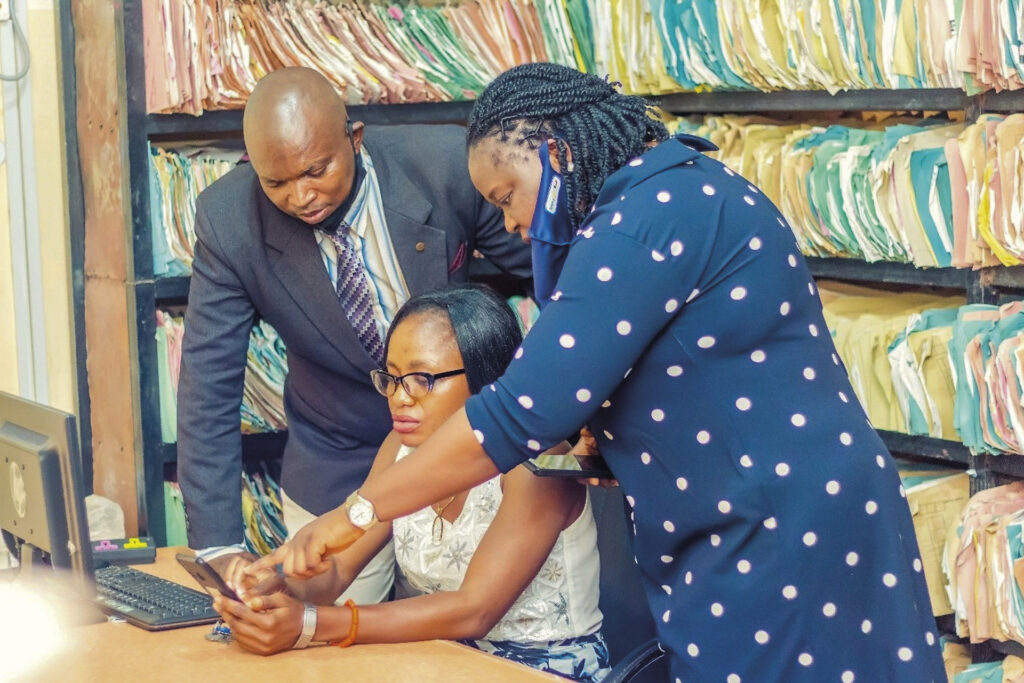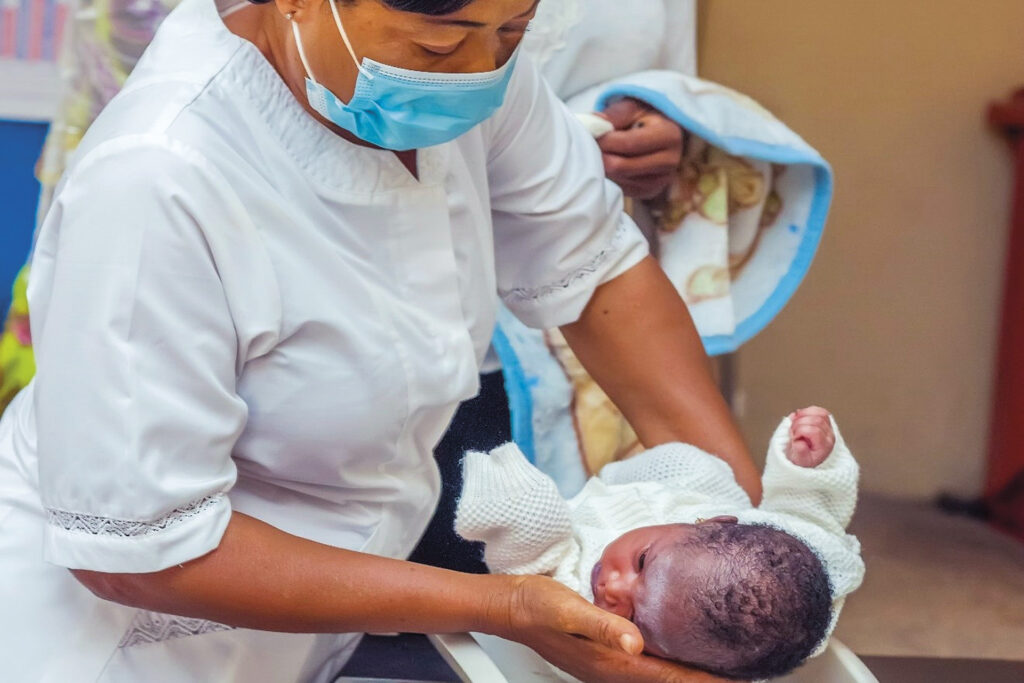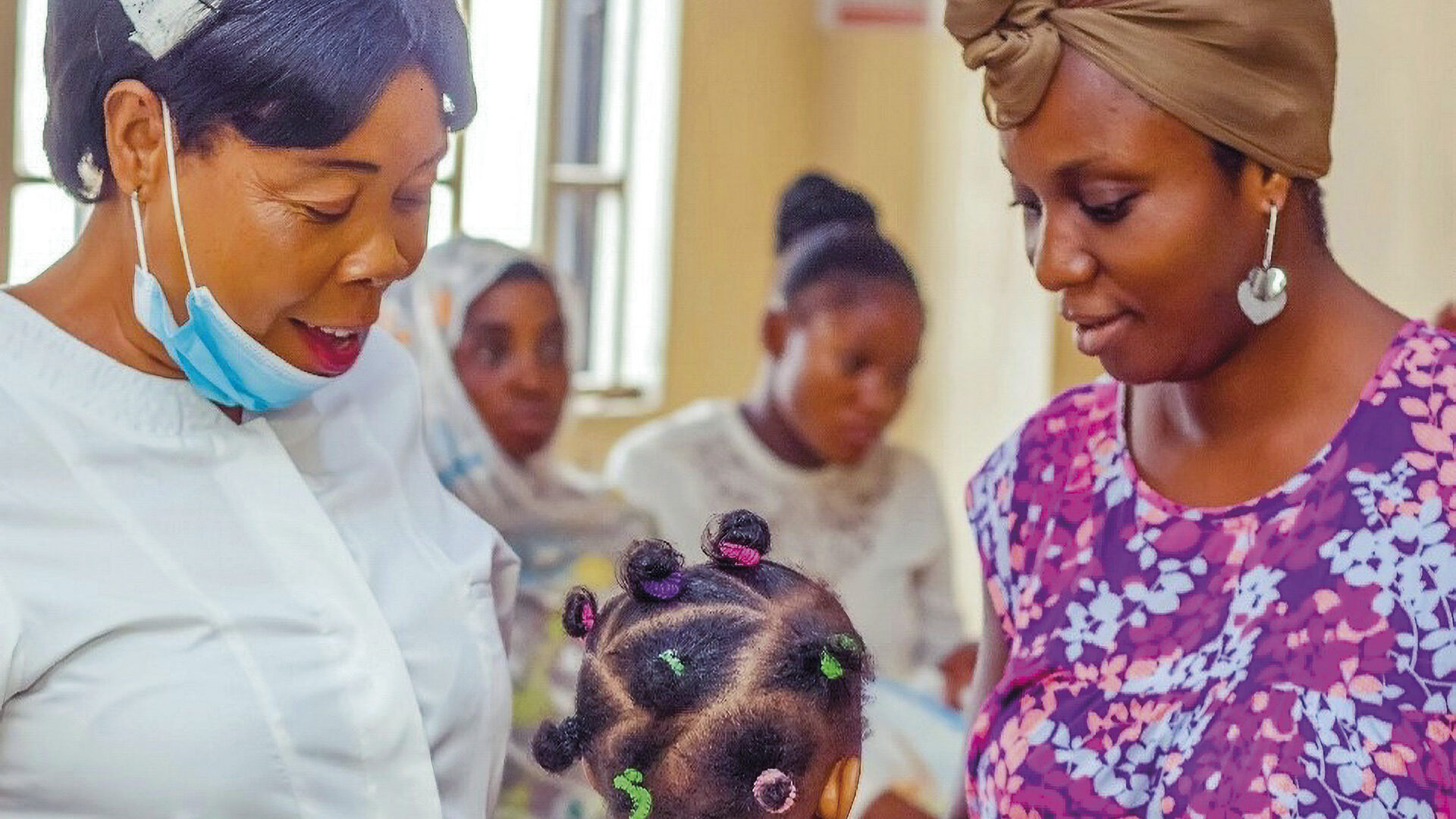Programs of Scale grant winner Together for Healthy Families in Nigeria helps families by focusing on the fundamental needs of women.
By Diana Schoberg
In March 1994, at the Anaheim Hilton and Towers, US, Emmanuel Adedolapo Lufadeju and Robert Zinser struck up a conversation. The two men were district governors-elect, and they had travelled to California — Emmanuel from Nigeria and Robert from Germany — for Rotary’s annual International Assembly. As they spoke, the men discovered that their interests overlapped, and Robert listened intently as Emmanuel described a visit he’d recently made to a hospital maternity ward in Nigeria. Emmanuel had been horrified to learn about the high rate of newborn fatalities that resulted, in part, from poor prenatal and maternal care.
Robert spoke up.
“I can help.”
In 1995, Emmanuel and Robert started a small maternal and child healthcare project in Nigeria’s northern state of Kaduna. Today, their interventions have spread across the country and are changing the lives of millions of families – all because of that serendipitous encounter 28 years ago.
“The story of our project is a story of Rotary friendship,” Emmanuel says. “I thought it was something I would do as governor and go away. But it has lasted the better part of my life.”
In June, The Rotary Foundation announced that the program, known as Together for Healthy Families in Nigeria, is receiving the Foundation’s second $2 million Programs of Scale grant, an award that will build on the program’s past success to accomplish even more in the future.
“This isn’t just any philanthropic project,” says John Townsend, chair of the Rotary Action Group for Reproductive, Maternal, and Child Health, and chair of the ethical review board at the Population Council. “This is really about changing the way societies and health systems address the fundamental needs of women. And that’s important because women are also the drivers of family and development. If a woman dies or is seriously disabled, the entire family is affected.”
Ultimately, Together for Healthy Families in Nigeria wants to reduce maternal and neonatal mortality in the target local government areas by 25 per cent. To do so, it aims to improve maternal health and access to family planning services while strengthening health systems at the national, state and local levels. It also aims to increase the use of maternal care and family planning services by educating community members about their benefits, and to train health care workers to improve skills and track data on maternal and neonatal deaths so that interventions can be tailored to specific needs.

Together for Healthy Families in Nigeria is sponsored by Rotary District 1860 (Germany) in partnership with Districts 9110, 9125, 9141, and 9142 (Nigeria), as well as the Reproductive, Maternal and Child Health Action Group. Rotarians and Rotaractors in Nigeria coordinate project activities, oversee training, lead advocacy efforts, and engage with the government. Members in Germany lend their technical and administrative expertise to support management, monitoring, and evaluation. The group has applied for funding from Germany’s Federal Ministry of Economic Cooperation and Development, which has been contributing since the very first project, including $1.36 million toward the most recent global grant project.
“Right from the beginning, they were the co-funders,” Robert says. “Not once, but always. You can convince somebody once for co-funding, but if you convince them year after year, you are on the right track.”
Nigeria is a prime location for maternal and child health work. The country accounts for 23 per cent of maternal deaths and 11 per cent of neonatal deaths worldwide, says Jan-Peter Sander, the lead contact for the Programs of Scale grant. The Rotary Action Group for Reproductive, Maternal and Child Health, which has targeted large projects in Nigeria, grew out of Robert and Emmanuel ’s early work.
“With interest because of [the grant], we will grow and grow,” Robert says.
As they plot their course forward, the program’s planners can find inspiration from their earlier progress. After their success in Kaduna, Rotary members in Nigeria and Germany partnered on a larger Foundation grant, which expanded the work to six states that contained almost 100 local government areas.
“We were focusing on these local government areas because 70 per cent of births in Nigeria are delivered at home,” Emmanuel says. “We got similar results: more women coming to clinics for deliveries, and more clinics built by the government to accommodate the increases in attendance.”
Then, a prominent gynecologist from Germany recommended focusing on quality assurance across the broad field of obstetrics: that is, quality of the facilities and equipment, quality of the process, and quality of the outcome. In 2008, Rotary members began collecting data on maternal deaths to help determine which interventions made the most sense – looking at not just how many mothers died but why. A scientific review, published in 2011, reported that the project had reduced maternal mortality by 50 per cent.
“That encouraged us,” Emmanuel says.

Soon after, the federal government of Nigeria was working on Maternal and Perinatal Death Surveillance and Response, a maternal death audit recommended by the World Health Organisation. Members of Rotary realised that their quality assurance work was similar, and they began collaborating with the government on that work. They had been working with a German statistician to translate their data into an electronic format, and in 2018 the digital platform he developed was integrated into the Nigerian health system. The platform allows statistics to be reported automatically, a first for the region, Emmanuel says.
In collaboration with the Nigerian government, what began as an eight-state electronic surveillance project spread nationwide. The Rotary project trained medical officers at the local, state and national levels on collecting and reviewing the data, and it supported government officials in introducing a bill, later passed by the Nigerian parliament, that required the accurate reporting of maternal deaths.
“We have made maternal death in Nigeria a notifiable condition. It can no longer be hidden. It is now in the public,” Emmanuel says. “The government can use this information to employ more staff, do their budget, concentrate on areas of need, and make sure their national planning includes aspects of maternal health.”
The Together for Healthy Families in Nigeria program of scale will take the lessons learned from the previous phases and perfect the system in three Nigerian states and the federal capital territory.
“We want a good model that we can replicate in other states in the country, and in other parts of Africa,” Emmanuel says.
The collaboration is key to the project’s sustainability.
“From the start, there was this connection with the government because we were thinking about sustainability and future funding,” he says. “If you want to do a project in Africa, if you do it without the government, traditional rulers, or political leaders, when you finish, the project dies.”
The program builds on the comprehensive work that Rotary has done in eradicating polio in Nigeria, which “developed a sense of trust and a sense of scale,” John Townsend says. “You’ve got to think about [polio] in a national, regional and global perspective, and certainly maternal health relates to that. This is something that requires a big scale, and Rotary in Nigeria is particularly well-placed. There are clubs all over the country, its members are influential, and there are increasing numbers of women in leadership. And they are committed to doing things that really make a difference for society.”
